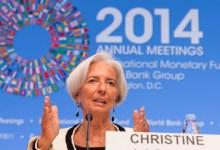
Typical street scene in Santa Ana, El Salvador. (Photo: iStock)
IMF Survey : More Growth, More Jobs Are Main Objectives of Meetings—Lagarde
October 9, 2014
- Annual Meetings to discuss how to achieve new growth momentum
- ‘Absolutely fine’ for affected countries to increase fiscal deficits to fight Ebola
- Infrastructure investment good way to support growth over short term
The IMF-World Bank Annual Meetings starting this week in Washington will discuss how to break through prolonged low growth and generate more growth and more jobs, IMF Managing Director Christine Lagarde said.

IMF Managing Director Christine Lagarde at news briefing: ‘Where growth is low and uneven, we believe that there has to be a new momentum’ (IMF photo)
2014 IMF–WORLD BANK ANNUAL MEETINGS
Addressing a news conference October 9 at the start of the Meetings, Lagarde noted that the IMF’s World Economic Outlook had trimmed its growth forecasts for the global economy.
“In the face of what we have called the risk of a new mediocre, where growth is low and uneven, we believe that there has to be a new momentum and that is what we will be discussing with the membership in the coming days.
“This new momentum—with, hopefully more growth, more jobs, better growth, better jobs—is certainly something we would call on the membership to produce,” Lagarde declared.
She said the IMF has noted growing country specificity in its analysis, where within each group of economies some countries are progressing and others are lagging behind. She said the IMF recommends action in three particular areas.
• Monetary policy where, particularly in the euro zone and Japan, more accommodative monetary policy is needed going forward to support the economy. At the same time the U.S. Federal Reserve is probably going to normalize its monetary policy and the IMF would urge emerging market and low-income and developing countries to prepare for heightened volatility.
• Fiscal policy, where more growth-friendly measures can be put in place as outlined in the IMF’s latest Fiscal Monitor that called attention to fiscal policies adjusted to support job market reforms. In addition, financial policies should be aimed at reducing excesses to make the financial system sounder, and strengthen its ability to help the recovery—as set out in the IMF’s latest Global Financial Stability Report.
• Increased investment in infrastructure can effectively support growth in the short term, by putting people to work through major construction projects or maintenance jobs. Infrastructure investment can also impact the supply side in the medium term by facilitating and accelerating the creation of value.
Responses to Ebola
Lagarde said the IMF was in a position to respond to challenges the world is facing, noting that she had met earlier with country representatives and officials coordinating responses to the Ebola outbreak in West Africa.
“It’s absolutely fine if those countries increase their fiscal deficit,” she stated, adding this was an indication of how the IMF mobilizes resources and revisits traditional standards. Last month the IMF provided a total of $130 million of emergency financial assistance to Guinea, Liberia, and Sierra Leone, the three West African countries at the center of the Ebola epidemic.
Lagarde noted that many low-income and developing countries are posting impressive growth rates. Such thriving economies make the Ebola epidemic even more threatening, she observed, because its effects might jeopardize economic recovery and waste hard-won gains.
Global Policy Agenda
Lagarde highlighted the IMF’s Global Policy Agenda, which will be discussed (see box) with the IMF’s policy-setting body, the International Monetary and Financial Committee during the Annual Meetings. She said the Agenda outlined the strategic direction of the IMF’s work over the next 12 months.
Aim higher, try harder
Aiming higher and trying harder to lift growth and build resilience is the collective goal targeted by the Global Policy Agenda that will be presented to senior officials by IMF Chief Christine Lagarde at the 2014 Annual Meetings.
The Global Policy Agenda, which will be discussed with the IMF’s policy-setting body—the International Monetary and Financial Committee—at its meeting on October 11, outlines policy priorities for the IMF’s 188 members and what the Fund can do to assist. It also offers a progress report on goals discussed by the membership and the Fund at the 2014 Spring Meetings in Washington.
The report says the IMF’s latest snapshot of the global economy looks uneasily familiar: a brittle, uneven recovery, with slower-than-expected growth and increasing downside risks. Bold and resolutely executed policies are needed to lift growth, build resilience, and achieve coherence.
Read the Global Policy Agenda
Responding to questions, Lagarde noted that measures have been taken by the European Central Bank to address the risks inherent in persistent low inflation, and added the IMF hopes more will be done in this area. The IMF has also pointed to the potential risk of recession in the euro area, “but if the right policies are decided and if both surplus and deficit countries do what has to be done, it is avoidable.”
Pointing to significant IMF engagement with Arab countries, Lagarde noted that much had been achieved in areas such as reducing subsidies and raising the efficiency of public finance in health and education and in providing safety nets for the poor. The IMF would continue to be involved, but the region needs the attention and the financial support of the international community, Lagarde stressed.
Lagarde said approval of the IMF’s 2010 quota and governance reforms “is an absolute must. It has to be implemented, and everybody knows that it is currently stuck before the U.S. Congress.” She said she hoped that the U.S. authorities would understand the importance of having an IMF that is representative of the global economy.


